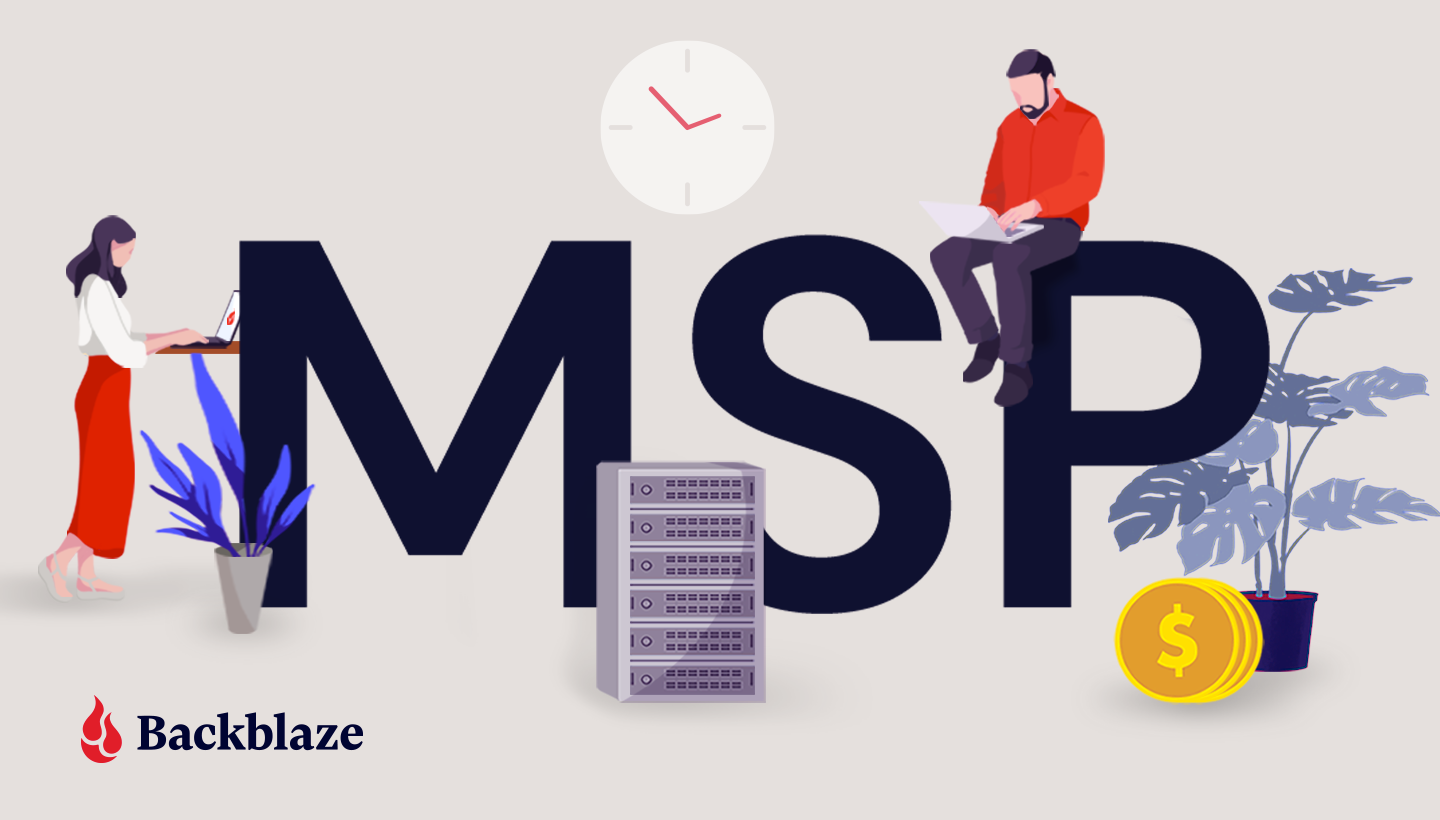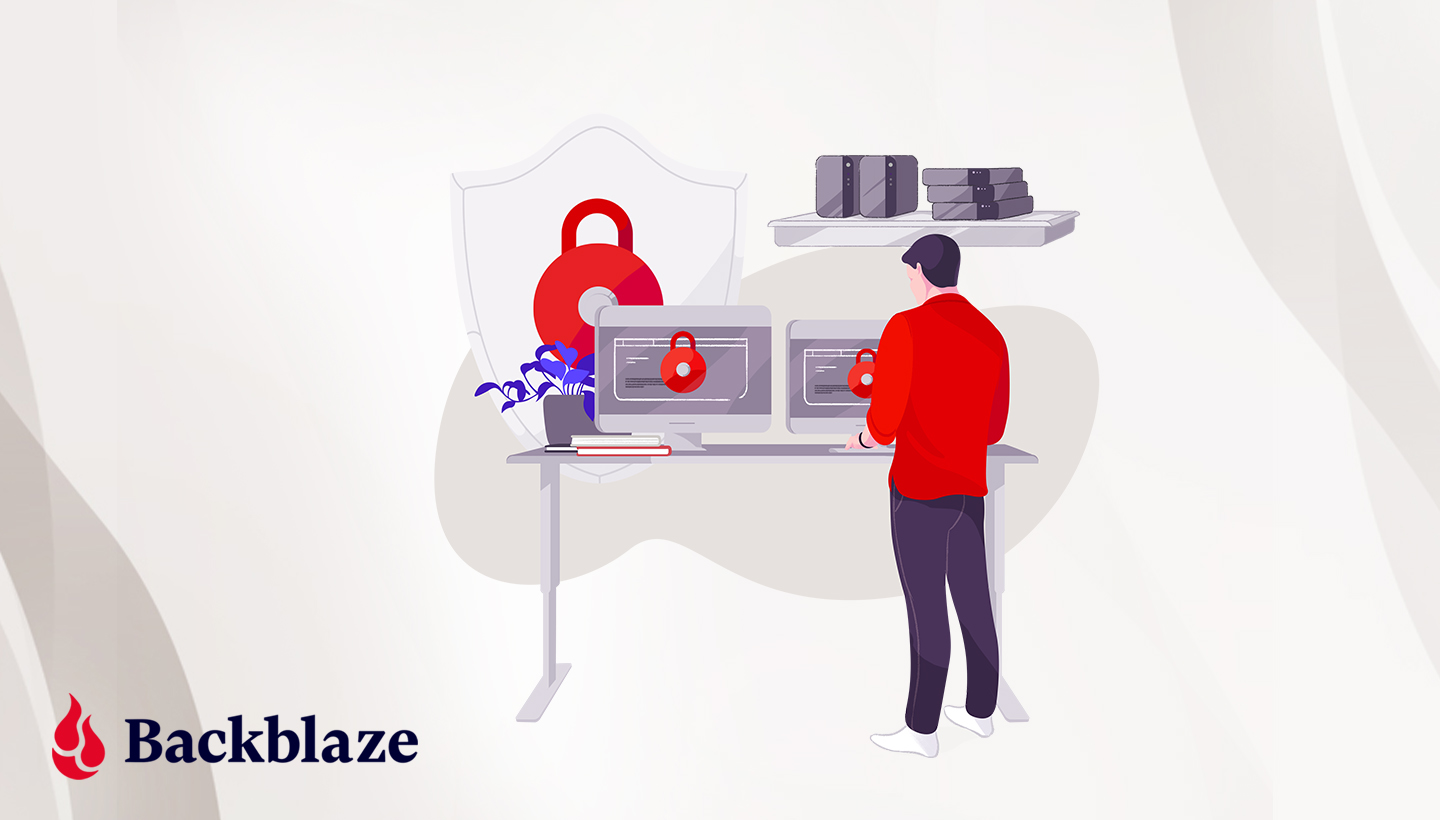Post Syndicated from Jeremy Milk original https://www.backblaze.com/blog/should-i-hire-a-msp/

Every business faces an ongoing IT question—when to manage some or all IT services or projects in-house and when to outsource them. Maybe you’re facing a new challenge, be it safeguarding against next-gen threats or deploying a new tech stack. Maybe a windfall of growth makes small IT problems bigger. Maybe your IT manager leaves suddenly, and you’re left in the lurch (true story). Or it may just be a desire to focus headcount elsewhere, difficulty finding the right talent, or a push for more efficiency.
If you’re nodding your head yes to any of the above, the answer may be to consider outsourcing a part of the project, or all of it, to a managed service provider. Especially as technologies and threats evolve, how you manage IT resources matters.
In this post, we explain why businesses should be thinking about IT management early on, and when and why hiring a managed service provider (MSP) makes sense when you don’t want to resource IT in-house.
What Is a MSP?
MSPs are companies that provide outsourced IT services to businesses. These services can range from offering light support as needed to installing and running new workflows and scalable systems ongoing. They can even help by leading technical build-outs as companies grow and move into new facilities.
A business can hire a MSP to provide help with one task that they would prefer not to be handled in-house, like data backup or disaster recovery, or they can outsource to an MSP to run their entire IT infrastructure.

When You Need More Than a Band-aid to Fix the Problem
Back to that true story I hinted at above, here’s a personal example from my past when I decided to hire a MSP: Many years ago, I was director of strategy and operations for a boutique management consulting firm when our sole IT manager rather abruptly decided to exit the organization. Before leaving, he emailed me—a fairly non-technical person at the time—instructions for maintaining on-premises servers and laptops in various states of readiness, along with advice that I shouldn’t let company leadership switch from PCs to Macs because it would wreak havoc. At this time, we had also recently deployed Microsoft Sharepoint for document management and storage, but the team hadn’t gotten used to it yet—they still relied on hard drives and emailing copies of important documents to themselves to back them up. What could we do?
My first thought had been to backfill IT management. Yet the team and I didn’t feel we had the knowledge to effectively assess candidates’ skills. We also saw the need and skillset evolving over time, so calling upon a trusted advisor to help vet candidates likely wasn’t the solution. Here were our key criteria:
- Competence to solve immediate problems.
- Vision to plan and execute for the future.
- Internal customer orientation.
- Cultural fit.
- Willingness to be called upon nights and weekends.
It was a big ask.
And we also weren’t sure if we needed a full-time resource forever. So instead of going that route, I started to explore outsourcing our IT infrastructure management and was happy to find MSPs that could effectively handle the organization’s requirements. The MSP that we ultimately chose brought executional excellence, strategic thinking, and high-quality service. I heard nothing but positive feedback from the greater consulting team—team members felt more supported and confident in using technology solutions. As a bonus, choosing a MSP to handle our IT management yielded around 25% IT budget savings compared to hiring a full-time employee and buying or deploying tools ourselves.
The MSP support model is a great choice both in the short or long term depending on a company’s needs, but it might not be right for every business. How do you know if hiring a MSP is right for you?
What to Consider When Hiring a MSP
There are a number of reasons that a company could outsource their IT management to a MSP. When weighing the options, consider the following:
- What services do you need?
- What skills do you have or wish to have in-house?
- How important are the services and skills you need (e.g. security versus less consequential services)?
- How long will you need support for these services and skills (e.g. ongoing versus one time)?
- What are your other considerations (e.g. budget, headcount, etc.)?

Services and Skills
MSPs offer a wide range of services and specialties, from isolated tasks like disaster recovery to ongoing projects like IT infrastructure management. The scope of your needs can help you decide whether hiring or relying on internal support can provide you with appropriate coverage, or whether outsourcing to a MSP will provide the necessary expertise. Some MSPs also specialize in specific industries with specific IT needs.
Security
Data security has never been more important, and the consequences of recovering from a cybersecurity attack are costly. If you already have a ransomware protection and disaster recovery system covered in-house, then you’re all set. On the other hand, if you’re not entirely confident that there is a system in place protecting your company data and backing it up, or if you feel that you or your team aren’t able to keep up with threats as they are evolving, a MSP can help take over that effort for you.
A MSP can identify any preventative or maintenance issues and address them before any data loss occurs. MSPs can also offer ongoing security monitoring and scan for vulnerabilities in your network, keeping your business ahead of a possible attack. Additionally, MSPs can help with regularly maintaining a company’s network so these important security measures don’t fall to the wayside.
Continuity Centers is a New York area-based MSP specializing in business continuity and disaster recovery.
In 2020, Continuity Centers implemented Veeam backup software to offer their customers added security and recovery support. They chose to implement Backblaze’s immutable backups feature with Veeam, so they are able to protect data in Backblaze B2 Cloud Storage from ransomware attacks or data loss. The savings that Continuity Centers gained from choosing Backblaze B2 as their cloud provider allowed them to offer enhanced data protection services without raising prices for their customers.
Support Duration
A MSP can provide one-time assistance or setup for a specific service you need, or longer-term management depending on the scope of the project. If your business requires 24/7 support, some remote MSP services are available for continuous assistance. Many MSPs offer real-time monitoring and management to ensure that any issues can be identified and fixed before they pose a threat to business operations.
Budget
Hiring an expert to handle IT management in-house can be costly—not to mention building and maintaining a team. Hiring a MSP can free up resources and save money in the long run with predictable, fixed prices.
Another important budgetary factor to consider is the cost of downtime in the case of a ransomware attack. While ransom payments continue to be one of the highest costs to businesses, the true cost of ransomware includes downtime, people hours, device costs, network costs, lost opportunities, and more. MSPs that provide business continuity services can help minimize these costs and ensure they’re avoided in the future.
Clicpomme is a Montréal, Québec-based MSP specializing in IT services and solutions for Apple products.
Their solutions range from device and IT infrastructure management to server deployment and off-site backup. Clicpomme uses the Backblaze mass deployment feature to easily deploy Backblaze software on customers’ endpoints at scale, so customers don’t have to handle deployment or backup management themselves.
Is a MSP Right for Your Business?
Are you considering getting help from a MSP with your IT management, or have you turned to one in the past? Comment with your questions or experience working with a MSP below.
The post Should I Hire a MSP? appeared first on Backblaze Blog | Cloud Storage & Cloud Backup.